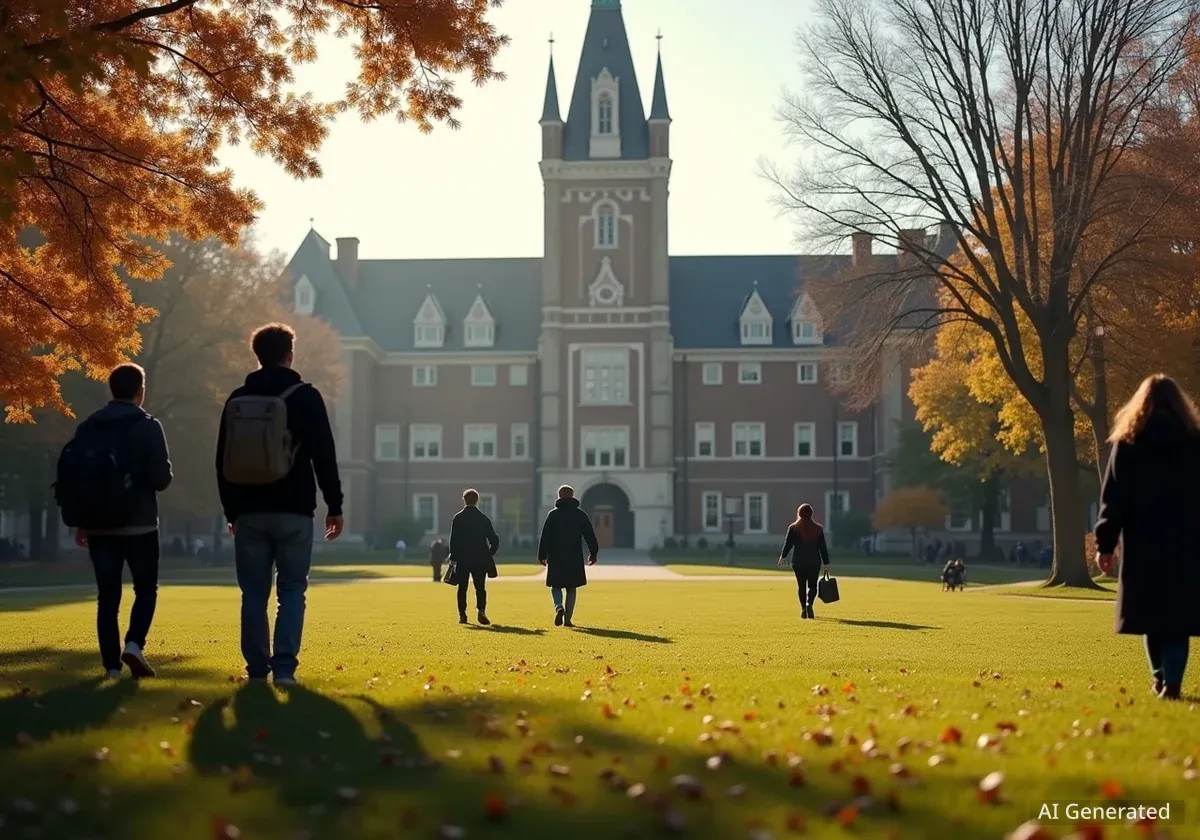Following the assassination of conservative commentator Charlie Kirk, a series of social media posts by employees at several publicly funded universities have ignited a national debate. The posts, which appeared to express approval of the event, have drawn intense scrutiny and raised questions about political expression, professional conduct, and the ideological climate within higher education institutions.
Key Takeaways
- Employees at four public universities made controversial social media posts following the assassination of Charlie Kirk.
- The incidents have prompted discussions about employee conduct, free speech, and potential hostility toward conservative students.
- The controversy highlights the significant role of non-faculty administrative and professional staff in university operations.
- These institutions receive hundreds of millions of dollars in state funding, leading to calls for greater accountability.
Incidents Emerge at Multiple State Universities
The controversy involves administrative and professional staff at universities in South Carolina, Tennessee, and Kansas. The online comments have led to concerns from critics who argue they create a hostile environment for students with differing political views.
Clemson University
At Clemson University in South Carolina, Robin Newberry, the Chief Environment, Health, and Safety Officer, reportedly shared a message on social media that read, "In a world full of Charlie Kirks and Brian Thompsons, be a Tyler Robinson or a Luigi Mangione." Newberry has been an employee at the university for three decades. Clemson University received over $330 million in state appropriations and grants for the 2024 fiscal year.
Middle Tennessee State University
Laura Sosh-Lightsy, an Associate Dean at Middle Tennessee State University, also faced criticism for social media activity that was interpreted as celebrating the assassination. According to her official biography, Sosh-Lightsy has two decades of experience in student development, with a focus on student conduct and support systems. The university was allocated $140 million in state funding for 2024.
Other Public Institutions
Similar incidents were reported at Winthrop University and the University of Kansas. At Winthrop, the university's Title IX coordinator allegedly shared a video that described Kirk as a "weapon of the enemy." This has raised questions about whether a staff member in such a sensitive role could remain impartial. Winthrop received over $49 million in state funds in 2024.
At the University of Kansas, an accessible print coordinator reportedly posted on Facebook that supporters of the Second Amendment are "better in the ground as worm food." The Lawrence campus of the University of Kansas received $178 million in state funding for 2024. As of now, no public disciplinary action has been announced in relation to the post.
The Role of Public Funding
Public universities rely heavily on state appropriations to fund their operations, including salaries for all employees. The recent incidents have led some lawmakers and taxpayers to question how public funds are being used and whether they are supporting environments that may be politically biased.
Focus Shifts to Non-Faculty University Staffing
The controversy has also brought attention to the structure of modern university employment. A significant portion of university workforces consists of non-teaching staff, a trend that has grown over the past several decades. These roles include administrators, coordinators, and various professional support positions.
University Employment Statistics
According to 2023 data from the National Center for Education Statistics, just over 64% of all employees at universities are not faculty members. This majority includes administrators, professional staff, and service workers who manage the day-to-day operations of the institutions.
Utah Valley University, where Kirk was assassinated, serves as a case study. The institution operates with an annual budget of approximately a quarter of a billion dollars and is one of the largest employers in Utah, with a payroll of 6,000 individuals. Of this number, only about one-third are directly involved in teaching students.
Critics argue that this administrative growth, often referred to as "bureaucratic bloat," creates layers of management that may not directly contribute to the core educational mission of the university. The recent social media incidents have intensified this argument, with some suggesting that these administrative roles are disproportionately held by individuals with strong ideological leanings.
State-Level Data on University Employment
Analysis of employment data reveals trends that challenge common political assumptions. When measured on a per capita basis, several Republican-led states have a higher number of university employees than many Democratic-led states.
A recent study found that four of the five states with the most university employees per 100,000 residents were states with Republican governors. On average, red states employ 100 more university employees per 100,000 residents than blue states.
This data point has become central to the argument that state governments, regardless of political affiliation, are overseeing a significant expansion of public university administration. The debate now centers on whether this expansion is necessary for modern university function or if it represents an inefficient use of taxpayer dollars.
"The issue goes beyond individual comments. It's about the structure and accountability of publicly funded institutions that are expected to serve all students, regardless of their political beliefs."
Implications for Campus Climate and Free Speech
The core of the debate revolves around the potential impact on students. Advocacy groups and some political figures have expressed concern that the public statements made by these university employees could have a chilling effect on conservative students, making them feel unwelcome or unsafe on campus.
Questions have been raised specifically about the roles these employees hold:
- Could a student feel safe reporting sex-based discrimination to a Title IX coordinator who has publicly expressed hostility toward their political worldview?
- Would students trust an associate dean of student conduct who appears to celebrate political violence?
- Can a health and safety officer be trusted to protect all students impartially after endorsing controversial figures?
These incidents have prompted calls for universities to review their employee conduct policies and clarify the line between personal political expression and professional responsibilities. The challenge for these public institutions is to balance the First Amendment rights of their employees with their obligation to provide an inclusive and non-discriminatory educational environment for all students.
As the discussion continues, Republican lawmakers in the affected states are facing pressure to address the use of public funds and ensure accountability within the higher education systems they oversee. The proposed solutions range from increased oversight and policy changes to calls for significant reductions in administrative staff and budget cuts for non-essential departments.





